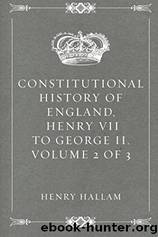Constitutional History of England, Henry VII to George II. Volume 2 of 3 by Henry Hallam

Author:Henry Hallam [Hallam, Henry]
Language: eng
Format: epub
ISBN: 9781530260737
Google: x8qdjwEACAAJ
Goodreads: 56569010
Publisher: CreateSpace Independent Publishing Platform
Published: 2016-02-27T00:00:00+00:00
The retention of the king's guards had excited some jealousy, though no complaints seem to have been made of it in parliament; but the sudden levy of a considerable force in 1667, however founded upon a very plausible pretext from the circumstances of the war, lending credit to these dark surmises of the court's sinister designs, gave much greater alarm. The Commons, summoned together in July, instantly addressed the king to disband his army as soon as peace should be made. We learn from the Duke of York's private memoirs that some of those who were most respected for their ancient attachment to liberty, deemed it in jeopardy at this crisis. The Earls of Northumberland and Leicester, Lord Hollis, Mr. Pierrepont, and others of the old parliamentary party, met to take measures together. The first of these told the Duke of York that the nation would not be satisfied with the removal of the chancellor, unless the guards were disbanded, and several other grievances redressed. The duke bade him be cautious what he said, lest he should be obliged to inform the king; but Northumberland replied that it was his intention to repeat the same to the king, which he did accordingly the next day.[659]
This change in public sentiment gave warning to Charles that he could not expect to reign with as little trouble as he had hitherto experienced; and doubtless the recollection of his father's history did not contribute to cherish the love he sometimes pretended for parliaments. His brother, more reflecting and more impatient of restraint on royal authority, saw with still greater clearness than the king, that they could only keep the prerogative at its desired height by means of intimidation. A regular army was indispensable; but to keep up an army in spite of parliament, or to raise money for its support without parliament, were very difficult undertakings. It seemed necessary to call in a more powerful arm than their own; and, by establishing the closest union with the King of France, to obtain either military or pecuniary succours from him, as circumstances might demand. But there was another and not less imperious motive for a secret treaty. The king, as has been said, though little likely, from the tenor of his life, to feel very strong and lasting impressions of religion, had at times a desire to testify publicly his adherence to the Romish communion. The Duke of York had come more gradually to change the faith in which he was educated. He describes it as the result of patient and anxious enquiry; nor would it be possible therefore to fix a precise date for his conversion, which seems to have been not fully accomplished till after the Restoration.[660] He however continued in conformity to the church of England; till, on discovering that the catholic religion exacted an outward communion, which he had fancied not indispensable, he became more uneasy at the restraint that policy imposed on him. This led to a conversation with the
Download
This site does not store any files on its server. We only index and link to content provided by other sites. Please contact the content providers to delete copyright contents if any and email us, we'll remove relevant links or contents immediately.
Room 212 by Kate Stewart(5105)
The Crown by Robert Lacey(4807)
Endurance: Shackleton's Incredible Voyage by Alfred Lansing(4769)
The Iron Duke by The Iron Duke(4349)
The Rape of Nanking by Iris Chang(4203)
Joan of Arc by Mary Gordon(4101)
Killing England by Bill O'Reilly(3995)
Say Nothing by Patrick Radden Keefe(3975)
I'll Give You the Sun by Jandy Nelson(3428)
Shadow of Night by Deborah Harkness(3360)
Hitler's Monsters by Eric Kurlander(3328)
Mary, Queen of Scots, and the Murder of Lord Darnley by Alison Weir(3202)
Blood and Sand by Alex Von Tunzelmann(3195)
Eleanor & Park by Rainbow Rowell(3153)
Darkest Hour by Anthony McCarten(3119)
Margaret Thatcher: The Autobiography by Thatcher Margaret(3079)
Book of Life by Deborah Harkness(2931)
Red Famine: Stalin's War on Ukraine by Anne Applebaum(2928)
The One Memory of Flora Banks by Emily Barr(2857)
